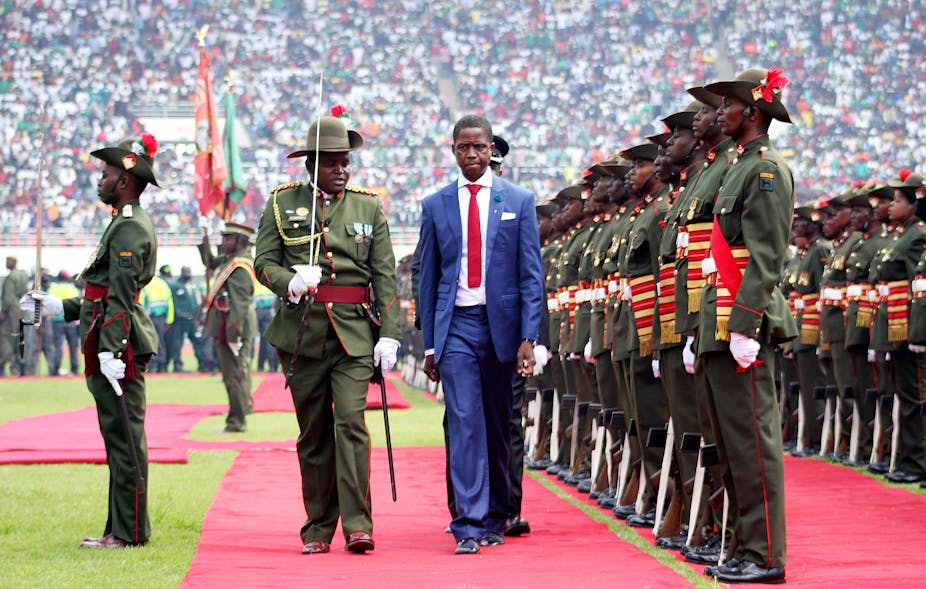The Zambian presidential election of January 20, held to choose a president to eke out the late Michael Sata’s term, were conducted amid thunderstorms that struck the entire country.
Thanks to the awful weather, only a third of registered voters made it to the polling stations, and voting had to be extended into the next day to accommodate stations that had opened late. Hapless polling officials had to lug their papers and boxes around by helicopter, four-wheel-drive, ox, and even on foot to reach some rural stations amidst the mud and downpours. Collecting the ballots for the count took just as long.
But despite all the logistical awkwardness, long queues of people still lined up for hours to vote in yet another ballot for yet another president replacing yet another whose tenure had ended in early death.
Steady hand
Ever since 1991, each president has lasted less time in office than his predecessor, and the new president, Edgar Lungu, may not break the trend. Lungu is only in his 50s, but he is rumoured to be sickly, with diabetes and an intimate affection for alcohol high on the list of his weaknesses. It remains to be seen if he’ll make it to the next elections when his term ends in 2016.
And this shaky-looking ruler takes the helm at a moment when Zambia, an economic bubble slowly and surely deflating before everyone’s eyes, needs stability and a sense of direction more than ever.
Lungu has promised a continuation of Sata’s policies, a set of measures that brought relief to the poor at the cost of sharply escalating public debt. The sinking international price of copper and a clumsily-announced new tax regime for foreign mining companies could scare investors away from the one significant revenue-earner the country has ever had. If investors get out, Lungu’s reign will not last long.
All this would work to the benefit of his rival, Hakainde Hichilema, who held Lungu very close: in the end the election was decided by only 27,000 votes, out of 1.7m cast.
It was stunning to see Hichilema run so strong. He had a southern power base, but was not expected to do well in other areas of the country. His gains outside the south were modest but noticeable – and, amazingly, in northern areas like Solwezi, close to the Congolese border, he did very well indeed.
Lungu has the more even spread of national support, and in a remarkably cohesive country of more than 70 ethnic groups, this is important. The cohesion cannot be taken for granted and must be cultivated, a lesson previous presidents have learnt well.
But if Lungu cannot handle the fraying economy well, the path will be clear for Hichilema in 2016.
Backstabbers

But the manner in which Lungu secured his party’s nomination cast dark shadows on Zambian politics, as the process became an unedifying spectacle of bullying and strong-arming, stacked party conferences and endless court proceedings. Knives were driven into backs everywhere, as if this were politics as usual.
Most of the main candidates for the presidency had been around a long time. And those who hadn’t were related to those who had been: at one stage, Lungu was being challenged for his party’s nomination by the assembled wife, son and nephew of the late President Sata. Two other candidates, representing other parties, were the sons of old luminaries, including of the former president, Kenneth Kaunda.
But no one had a programme. Everyone talked in soundbites and in the vague language of “virtue” – for corruption is rampant – but no one set out a detailed economic programme for the hard times ahead.
This was probably inevitable when the contest was for a presidency that will only last a year. The campaigning will be scarcely over when it must start again. Zambians are used to endless elections and, although Hichilema cried foul on several occasions – until he began to seem like the boy who cried ‘wolf’ too many times – he himself knows he is well poised for the real contest in 2016.
But, despite the imperfections of the process, this was still an actual contest. No one rigged the outcome, despite the rumours bouncing around social media – and it was regarded deep down by all concerned as something very like the real thing.
So when Zimbabwean President Robert Mugabe turned up for Lungu’s inauguration (arriving before a formal announcement of his victory had even been made), a spontaneous demonstration of Zambians organised itself in front of his luxury hotel, chanting “Mugabe must go.”
It was peaceful, but it made a real point: Zambia’s democracy is a lot more assured and healthy than its Zimbabwean counterpart. And this clearly makes the voting-weary Zambians, standing soaked to the skin in slow-moving lines, justly proud.

